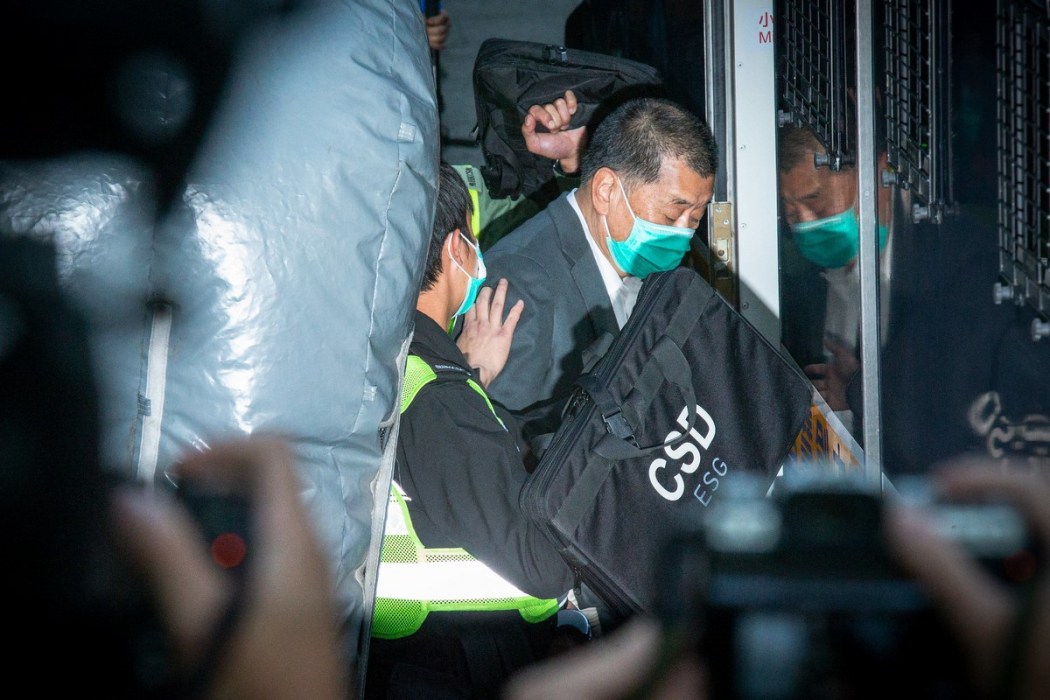Hong Kong’s Court of Appeal has blocked pro-democracy media tycoon Jimmy Lai’s bid to challenge a national security search warrant of his phones, which he says contained protected journalistic materials, at the city’s top court.
Previous attempts made by the founder of defunct pro-democracy newspaper Apple Daily to block the warrant were twice rejected at the High Court in August and October last year.

The latest application, filed by Senior Counsel Philip Dykes on behalf of Lai, raised two points for the Court of Appeal to certify in order to raise the case to the top court.
The court was asked to certify whether search and seizure provisions under the implementation rules of the security law were subject to Part 12 the Interpretation and General Clauses Ordinance (IGCO) that relates to the search and seizure of journalistic materials.
Then, if the implementation rules were not subject to Part 12 of the IGCO, the court was asked to certify what steps a magistrate must take “to ensure that the seizure of journalistic material is justified.”
The Court of Appeal judges – Chief Judge of the High Court Jeremy Poon, and Vice Presidents of Court of Appeal Susan Kwan and Carlye Chu – ruled on Monday that Lai had failed to make “a proper case,” calling both points “radically new.”
“It is a well-established practice of the Court of Appeal not to grant leave to appeal on new points not previously canvassed in the appeal proceedings before it,” the judgement read.
The judges also ruled that the issues raised by the media tycoon had become “academic,” as the police had already accessed the journalistic materials in question following the court’s earlier ruling.

“In short, the underlying dispute of the intended appeals has ceased to exist,” the court ruled.
Lai’s latest application was also filed after the deadline for appeal, which was October 26, 2022. The media tycoon’s team said that at the time of the court’s ruling over the search warrant, Lai, his family and lawyers “were overwhelmed by multiple sets of proceedings.”
They cited Lai’s national security trial, the media tycoon testing positive for Covid-19 on September 29 last year, and the serving of “several notices of additional evidence” between September and October.
Lai’s team also cited cited the admission of Timothy Owen, an overseas counsel now essentially barred from representing the media tycoon at trial, on the same day as the previous appeal court ruling, and Lai’s conviction in a fraud case.
The police chief opposed the media tycoon’s explanation, and said that Lai had employed a “sizable” team of legal representatives, and that “many” of the events Lai cited “would not significantly impede him in making the application for certification on time.”
The judges ruled that even if the delay was not substantial and excusable, given their ruling “on the merits of the application,” it would be “futile” to extend the time for making the application.
Warrant for ‘specified evidence’
Lai, 75, has been held in custody since December 2020. He is accused of two counts of conspiracy to collude with foreign forces, and one count of collusion with foreign forces under the Beijing-imposed national security law, and has also been charged under the colonial-era sedition law over allegedly seditious publications.

The collusion charge has, however, been left on court files, meaning that while the prosecution reserves the right to proceed with the charge, they cannot do so without a judge’s approval.
Lai is currently serving a five-year-and-nine-month prison term for fraud related to the lease of Apple Daily’s headquarters in Tseung Kwan O.
According to Lai’s legal team, the police confiscated two phones from Lai’s home on August 10, 2020, the same day that over 100 police officers raided the newspaper’s headquarters.
Lai identified thousands of items on the two phones as journalistic material, which is supposed to be protected from police search and seizure. The commissioner of police disputed 8,179 claims.
Under the sweeping security law, magistrates may grant a search warrant if they believe “there is reasonable ground for suspecting that any specified evidence” will be found.

The media tycoon applied for leave to apply for a judicial review last August, but the application was rejected by High Court Judge Wilson Chan later that month.
Lai then filed another appeal against Chan’s decision, which was rejected by the Court of Appeal last October.
In previous hearings, Lai’s team argued that “specified evidence” should not be interpreted to include journalistic materials, which were usually protected from police search and seize operations.
The national security trial against Lai is set to resume in September 25 this year.
In June 2020, Beijing inserted national security legislation directly into Hong Kong’s mini-constitution – bypassing the local legislature – following a year of pro-democracy protests and unrest. It criminalised subversion, secession, collusion with foreign forces and terrorist acts, which were broadly defined to include disruption to transport and other infrastructure. The move gave police sweeping new powers, alarming democrats, civil society groups and trade partners, as such laws have been used broadly to silence and punish dissidents in China. However, the authorities say it has restored stability and peace to the city.
Support HKFP | Policies & Ethics | Error/typo? | Contact Us | Newsletter | Transparency & Annual Report | Apps
Help safeguard press freedom & keep HKFP free for all readers by supporting our team
























